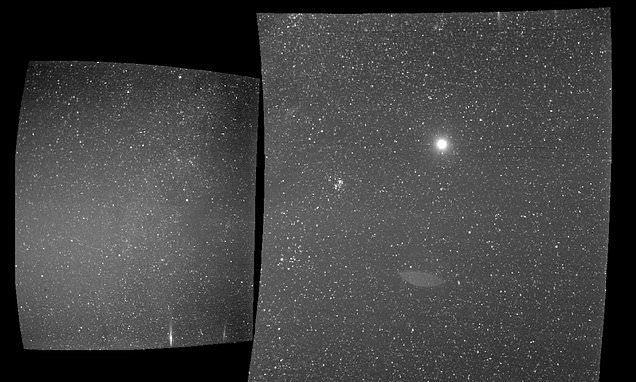Page 9425
Oct 26, 2018
Uranus Will Be Visible To Everyone In Britain This Evening
Posted by Michael Lance in categories: habitats, space
Oct 26, 2018
Emerging From the Trance
Posted by Steve Hill in categories: biotech/medical, life extension
It seems that opposition against anti-aging medicine may be slowly starting to crumble. For example, Lifespan.io’s current crowdfunding campaign is going extremely well, and journalists begin to talk about senolytics in positive terms, without any predictions of doom and gloom resulting from these upcoming drugs. Make no mistake—the pro-aging trance is still alive and well; for each journalist who puts time and effort into actually understanding senolytics and the health benefits that they are expected to bring to older people, there’s probably five who show little to no knowledge of the subject and rage against unspecified “immortality” technology and related impending catastrophes. This should tell us something about the kind of understanding they have of what they criticize—or how badly they need a clickbait piece to bring in visitors.
Today, the pro-aging trance is something that only rejuvenation advocates are aware of and battle against, but maybe, fifty years from now, it will be an interesting phenomenon of the past for psychologists to figure out. Maybe, on the YouTube of 2068, there will be videos making fun of it in pretty much the same way that some people today make fun of the old belief that hysteria was caused by stray uteruses wandering around women’s bodies.
The pro-aging trance is rather interesting indeed, as people who are subject to it tend to commit fallacies that they would never commit in other contexts. A very good example of this is the objection to inequality of access: this reasoning assumes that rejuvenation would not be available to everyone who needs it, for economical, political, or whatever reasons; understandably, this is perceived as a profound injustice, which pushes a fair number of people to make a leap and conclude that the best way to avoid this injustice is to never develop rejuvenation to begin with.
Oct 26, 2018
You are the company you keep—A new screening method detects direct biomolecule interactions
Posted by Xavier Rosseel in categories: biotech/medical, genetics, health
Proteins are the building blocks of the cell. They do most of the work and are essential for the structure, function and dynamic regulation of the cell and body’s tissues and organs. Proteins rarely work alone, they interact, form protein complexes or bind DNA and RNA to control what a cell does. These complexes are key pieces of many important reactions within the cell, such as energy metabolism or gene regulation. Any change in those interactions, which can for example be caused by a mutation, can make the difference between health and disease. Hence, for understanding how cells operate, or what might go wrong in ill cells, it is essential to know how their building blocks interact.
New technologies allowed scientists during the last decades to understand the genetic information an organism possess, which of this information is actively used and which proteins are made by the cell in different circumstances. Now it is a big challenge to understand how biomolecules such as proteins and RNA messenger molecules combine to form the complexes required for a functional cell. In other words, we know the ten thousands of parts a cell is build off, but we don’t know how they belong together.
In a paper published in Nature Communications, scientists at the Centre for Genomic Regulation (CRG) describe the development of a new method, named “rec-YnH”, which was designed to understand the complexes formed between hundreds of proteins and RNAs at the same time.
Oct 26, 2018
DNA ‘dances’ in first explanation of how genetic material flows through a nucleus
Posted by Xavier Rosseel in categories: biotech/medical, genetics, nanotechnology
“Previous work mostly focused on what was going on at the microscale of DNA,” says study co-author Michael Shelley, group leader for biophysical modeling at the Flatiron Institute’s Center for Computational Biology in New York City and co-director of the Courant Institute’s Applied Mathematics Laboratory at New York University. “People didn’t really think about what was going on at the larger scale.”
Shelley and colleagues simulated the motions of chromatin, the functional form of DNA inside the nucleus. Chromatin looks like beads on a string, with ball-like clusters of genetic material linked by strands of DNA. The researchers propose that molecular machines along the DNA cause segments of the chromatin to straighten and pull taut. This activity aligns neighboring strands to face the same direction. That alignment, in turn, results in a cascading waltz of genetic material shimmying across the nucleus.
The dancing DNA may play a role in gene expression, replication and remodeling, though the exact effects remain unclear, the researchers reported online October 22 in Proceedings of the National Academy of Sciences.
Oct 26, 2018
Breathtaking video captures meteor exploding in night sky: It’s ‘a once-in-a-lifetime thing’
Posted by Genevieve Klien in category: futurism
A man in the U.K. managed to capture photos and video of a lifetime, documenting the exact moment when a meteor exploded and then disintegrated above a castle.
The images and video were caught during the Orionid meteor shower on Saturday, Oct. 20, SWNS reports. 44-year-old Nick Jackson was heading to take images of Clun Castle in Shropshire when the celestial object made its debut.
Mid-way during the shoot, Jackson saw the giant meteor behind the castle and said: “I immediately thought, ‘I hope that was caught in the frame.’”
Oct 26, 2018
Image of Earth is captured 27 million miles from our planet
Posted by Michael Lance in category: futurism
Oct 26, 2018
Physicists demonstrate magnetometer that uses quantum effects and machine learning
Posted by Genevieve Klien in categories: cosmology, quantum physics, robotics/AI
Researchers from the Moscow Institute of Physics and Technology (MIPT), Aalto University in Finland, and ETH Zurich have demonstrated a prototype device that uses quantum effects and machine learning to measure magnetic fields more accurately than its classical analogues. Such measurements are needed to seek mineral deposits, discover distant astronomical objects, diagnose brain disorders, and create better radars.
“When you study nature, whether you investigate the human brain or a supernova explosion, you always deal with some sort of electromagnetic signals,” explains Andrey Lebedev, a co-author of the paper describing the new device in npj Quantum Information. “So measuring magnetic fields is necessary across diverse areas of science and technology, and one would want to do this as accurately as possible.”
Oct 26, 2018
The ‘Best Illusion of the Year’ Will Make You Mistrust Your Brain
Posted by Genevieve Klien in category: neuroscience

Every year, various members of the illusion community—which is made up of scientists, neurologists, researchers, and even artists—get together to decide which of their recently created mind-melters deserves the honor of Best Illusion of the Year. This year, Japan’s Kokichi Sugihara claimed the top prize with a deceptively simple illusion that plays with how our mind perceives 3D objects.
This isn’t the first time Kokichi Sugihara, a mathematician at Meiji University in Japan, has won the Best Illusion of the Year honor. Nor is it the first time his fantastic illusions have shown up on Gizmodo. Triply Ambiguous Object, his latest award-winning creation, appears to be a simple 3D structure, with a tiny flag mounted on one of its many corners.
Continue reading “The ‘Best Illusion of the Year’ Will Make You Mistrust Your Brain” »

















